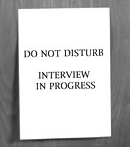Doctors and Interviews
20 May 2014
How can Doctors improve their interview performance?
 I’ve been pretty busy recently, some of which has been supporting doctors through interview processes for jobs. This has included people applying for training grade and consultant posts.
I thought it would be useful to note down some useful steps in managing the process, and anxiety.
My four stage process:
1. Purpose
Be clear about your purpose for applying for this post. That might appear to be obvious for those of you in training grades, but it’s always useful to reflect and consider the speed of your journey and the variety of experiences it offers you. The drive to get to the next stage is strong, but the end goal is not your only consideration. If you are beyond training, then make sure your purpose for looking elsewhere is clear. You might too easily focus on ‘moving away’ from an undesirable situation, but it is equally important to ‘move towards’ something that is right for you and your circumstances.
Tip – do not underestimate the emotions this can generate.
2. Plan
Plot what you need to do and by when in order to be ready. Again, this may appear obvious but focusing too heavily on ‘the big day’ is a common mistake. Get the planning and organisation right and the actual interview itself is far less of a trial. Break down the known interview areas and plan out what your experience and knowledge is on this subject. Think about the meaningful examples you can talk about (animatedly) that are authentic and credible.
Tip – create a practical plan that you can work on steadily, within the timeframe.
3. Practice
Practicing your answers and talking through your ideas is crucial to making sure you produce a polished performance on the day. Doing this with friends or colleagues is good, but alone can also work. Hearing yourself articulate your responses is a great way to make sure that you are being succinct and specific. If you are required to do a presentation, practice it. Dress rehearsals help expose gremlins and it’s better to uncover these whilst practicing.
Tip – Don’t leave this till the last minute, have several goes at it.
4. Performance
Make sure you are in the right frame of mind on the day. This really matters but will be helped considerably by the previous stages. If you have got 1, 2 and 3 right then you should be feeling pretty good at this point. However, make sure that you are ready to display the very best version of you. Make a note of how you present yourself at your best. What does it look like and how does it feel?
Tip – Consider what impression you want to leave and how you will achieve that.
I’ve been pretty busy recently, some of which has been supporting doctors through interview processes for jobs. This has included people applying for training grade and consultant posts.
I thought it would be useful to note down some useful steps in managing the process, and anxiety.
My four stage process:
1. Purpose
Be clear about your purpose for applying for this post. That might appear to be obvious for those of you in training grades, but it’s always useful to reflect and consider the speed of your journey and the variety of experiences it offers you. The drive to get to the next stage is strong, but the end goal is not your only consideration. If you are beyond training, then make sure your purpose for looking elsewhere is clear. You might too easily focus on ‘moving away’ from an undesirable situation, but it is equally important to ‘move towards’ something that is right for you and your circumstances.
Tip – do not underestimate the emotions this can generate.
2. Plan
Plot what you need to do and by when in order to be ready. Again, this may appear obvious but focusing too heavily on ‘the big day’ is a common mistake. Get the planning and organisation right and the actual interview itself is far less of a trial. Break down the known interview areas and plan out what your experience and knowledge is on this subject. Think about the meaningful examples you can talk about (animatedly) that are authentic and credible.
Tip – create a practical plan that you can work on steadily, within the timeframe.
3. Practice
Practicing your answers and talking through your ideas is crucial to making sure you produce a polished performance on the day. Doing this with friends or colleagues is good, but alone can also work. Hearing yourself articulate your responses is a great way to make sure that you are being succinct and specific. If you are required to do a presentation, practice it. Dress rehearsals help expose gremlins and it’s better to uncover these whilst practicing.
Tip – Don’t leave this till the last minute, have several goes at it.
4. Performance
Make sure you are in the right frame of mind on the day. This really matters but will be helped considerably by the previous stages. If you have got 1, 2 and 3 right then you should be feeling pretty good at this point. However, make sure that you are ready to display the very best version of you. Make a note of how you present yourself at your best. What does it look like and how does it feel?
Tip – Consider what impression you want to leave and how you will achieve that.
